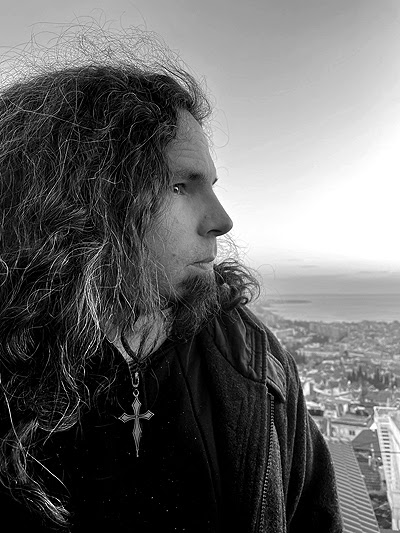
News from the outer world are pouring in as well, such as the inclusion of 1st of May square in Piran on the list of the Treasures of European Film Culture by the European Film Accademy. Also, Urška Djukić’s Little Trouble Girls will enjoy its North American premiere at Tribeca film festival, where it is selected for the International Narrative Competition.
It is busy on the home turf as well, since two projects, Maja Križnik’s film Uncomfortable Beings and Tomaž Gorkič’s series The Monster Behind the Iron Curtain are in the shooting stage, while a few films are entering the distribution both in Slovenia and abroad. However, the biggest news is the new project Kino Slovenia done in co-operation by several film institutions in which the selected Slovenian films of all forms and genres will be screened for the audiences between April 18 and June 20. Also, a concert by the Slovenian composer, pianist and improviser Drago Ivanuša, on which he will revive certain moments of the Slovenian cinema from the 90s, is scheduled for April 24, and we will write about it in our next issue.
Without further ado, we are Ready to Roll!
Kino Slovenia
On Tuesday, April 15, the press conference took place at the Academy for Radio, Theatre, Film and Television (AGRFT) in Ljubljana where the launch of the Kino Slovenia project was announced. The cycle of screenings of 16 feature films and 23 shorts in the presence of filmmakers, actors and crew members takes place between April 18 and June 20 on the locations of AGRFT and the Slovenian Cinematheque.

The opening film is the last year’s Slovenian entry for Oscars, Family Therapy by Sonja Prosenc, followed by the double bill consisting of Martin Turk’s feature-length docu-fiction work Kino Volta and Barbara Zemljič’s short fiction How I Learned to Hang Laundry on April 25. Recent festival and theatrical hits such as Maja Doroteja Prelog’s Cent’anni, Urška Djukić’s Little Trouble Girls, Klemen Dvornik’s Block 5, Slobodan Maksimović’s Praslovan, Žiga Kukovič’s Gepack and Tosja Flaker Berce’s Kaj + Ester Forever will also be screened. The program will also host the theatrical premiere of Miha Čelar’s Two Brothers, Two Sisters followed by a special roundtable. The complete schedule can be found here.
The representatives of the organizations behind the project, Lev Predan Kovarski and Jasna Pintarič of the Slovenian Film Database, as well as Klemen Dvornik and Petra Vidmar of The Slovenian Federation of Filmmakers’ Guilds stated the importance of the Slovenian films being presented to the audiences in the presence of the authors, cast and crew members and the advantages of theatrical screenings as opposed to watching films at home. The project is envisioned as more than just a cycle of screenings, as it should serve as the channel of communication between the filmmakers, movie theatres and audience. They also noted that the promotion of the national cinema tends to stick to the conservative strategies which might not be the right ones, so the project will be followed by the specially designed campaign on social networks.
Kino Slovenia is supported by the AGRFT, the Slovenian Cinematheque and Slovenian Film Centre.
1st of May Square in Piran listed as European Film Culture Treasure
On Wednesday, April 16 the European Film Academy (EFA) updated the list of the European Film Culture Treasures with 11 new locations. One of them is also 1st of May Square in the coastal town of Piran which is often shot in Slovenian and international films. The project started back in 2022, the list now counts 60 locations of Europe, and it will be updated on yearly bases.
The coastal town of Piran has a rich cinematic history that started with the Czechoslovak filmmaker František Čáp who moved to Slovenia, then part of Yugoslavia, back in the 50s and filmed a number of classics like Vesna (1953) that are now regarded as the foundation stones of the Slovenian-language cinema. His film Our Car (1962), filmed in Piran, is one of two main reasons for inclusion of the urban piazza, formerly known as Old Square on the list of the European cinema heritage. The other is the 1985 hit film A Summer in a Seashell by Tugo Štiglic.
Otherwise, Piran is regarded as a very photogenic coulisse visited by the international celebrities like Orson Welles, Marcello Mastroianni, James Mason, Maximilian Schell, Sam Peckinpah, Klaus Kinski, Yves Montand, Alida Valli, Gillo Pontecorvo, George Hamilton, Peter Lawford and many others. In 2021, Piran has been selected as a filming location for the recent Netflix production The Union, starring Halle Barry and Mark Wahlberg in main roles. The film, directed by Julian Farino is still available in the platform’s catalogue. Recently, it could also be seen as the main location lifted to the level of a character in the Slovenian director Vinci Vogue Anžlovar’s last film Tartini’s Key.
The other locations include urban spaces like Malko Tarnovo Street in the Bulgarian capital of Sofia and the Liège-Guillemins railway station in Belgium (glimpsed in the Dardenne brothers’ Lorna’s Silence), the iconic theatres Tuchinsky in Amsterdam and Tivoli in Lisbon, The Quiet Man museum in Cong, Ireland and the The Malta Film Studios, as well as the wide landscape of the Curonian Spit in Lithuania and the locations of the iconic movies such as Summer Riding School in Salzburg (The Sound of Music) and Berghotel Shatzalp in Davos (Paolo Sorrentino’s Youth).
Bolzano Film Festival Bozen
The 38th edition of Bolzano Film Festival Bozen took place in the South-Tyrolean town from April 4-13. From the Slovenian perspective, the most significant part of it was the fact that it hosted the Italian premiere of Urška Djukić’s Little Trouble Girls.
Djukić’s film premiered as the opening one of the newly established Perspectives competition at Berlinale, where it was crowned by the jury of film publicists FIPRESCI. Staged as the co-production between Slovenia’s SPOK Films and Nosorogi, Italian Staragara Productions, Croatian Izazov 365 and Serbian Non-Aligned Films, it is being internationally sold by Heretic Outreach. While the world-wide distribution strategy is still under wraps, the news arrived that its North American premiere is scheduled for June 5 at the International Narrative Competition of Tribeca Film Festival.
The other news is that the main award of the festival for Best Film went to a Slovenian minority co-production. Stefan Đorđević’s creative documentary Wind, Talk to Me is staged in co-production between Serbia, Croatia and Slovenia, and it premiered earlier this year at the main Tiger competition at International Film Festival Rotterdam. Bolzano was its first stop on the festival tour, while the next one is scheduled for Indie Lisboa that will run from May 1-11.
ZagrebDox
Slovenian cinema also had the significant presence at the 21st ZagrebDox with three Slovenian films and majority co-productions scattered around the festival’s large and diverse programme.
The biggest news is probably the Croatian Radio-Television (HRT) Audience Award for regional documentaries that went to Maja Prettner’s Woman of God. Prettner’s film, produced by Studio Virc, was selected for the Controversial Dox section and it follows the evangelical priestess Jana who faces the dilemma whether to leave priesthood and break the long family tradition in order to deal with the trauma in her past. Woman of God has been around the festival circuit since its premiere at the 12th DokuDoc back in 2023 and has been scooping awards since Vesna Award for Best Editing, Vesna Audience Award and FIPRESCI award at the Festival of Slovenian Film from the same year. Its festival tour included the international premiere at the 2024 edition of Hot Docs and the screening at 2024 Torino Film Festival.
Two more Slovenian films were screened. Petra Seliškar’s mid-length My Summer Holiday enjoyed the regional premiere after the world one at FIPADOC earlier this year. The chance had it that the screenings of My Summer Holiday at ZagrebDox almost collided with the world premiere of Seliškar’s feature-lenght documentary The Mountain Won’t Move at Visions du Réel. The two films are quite different style-wise, while they share the same production companies (Petra Pan Film Productions from Slovenia, PPFP from North Macedonia and Cinéphage Productions from France), the same location of Solunska Glava peak in North Macedonia, as well as the same characters, the shepherd brothers who keep the centuries-long tradition.
Finally, Slobodan Maksimović’s Praslovan, centred around the life and the career of the musician Zoran Predin who enjoys the cult following around former Yugoslavia, was screened in the Music Globe section. Capitalizing on Predin’s cult status, the documentary staged in co-production between Slovenia and Croatia (through companies Invida, Jaka Produkcija, Gustav Film, RTV Slovenia, Film Factory, 001 and Vizualist) already fares well regionally since its premiere at the last year’s Sarajevo Film Festival, and its screening at ZagrebDox launched a tour in Croatian independent cinemas.
Crossing Europe
At this year’s Crossing Europe Film Festival in Linz that runs from April 29 – May 4, Slovenian documentary and experimental cinema has a special place and even a special programme slot. The festival will showcase Matevž Jerman’s and Jurij Meden’s documentary Alpe Adria Underground! that thematizes the experimental cinema in Slovenia during the time of the socialist Yugoslavia whose largest part of body of work was realized outside the official studio system.
The archival documentary offers a thorough insight into the scene and making it was quite an endeavour, since a lot of the material was sorted and digitalized in process. Produced by Temporama in co-production with the Slovenian Cinematheque and RTV Slovenia, the documentary premiered at last year’s Dokufest in Prizren, Kosovo, followed by screenings at the Festival of Slovenian Film, Archivo Aperto and LIFFe.
Along with Alpe Adria Underground!, Matevž Jerman also curated the retrospective programme focusing on newer Slovenian experimental shorts. Films from 2016-2024 by up-and-coming female filmmakers such as Maja Doroteja Prelog, Ester Ivakič, Nika Autor, Kukla, Nika Tomažič and others will be screened on May 3.
Oberhausen
The International Short Film Festival Oberhausen, one of the oldest and biggest short film gatherings globally, runs for the 71st time in the German city from April 29 – May 4. Slovenian cinema will be represented by two shorts staged as Slovenian majority co-productions.
Žiga Virc’s Kismet, produced by Studio Virc in co-production with Nukleus Film and Korektif will enjoy the world premiere in Children’s and Youth Film Competition. The plot revolves around an 11-year-old Romani girl Milena who, while she sees her older sister preparing to get married, wonders if her “destiny” to follow the sister’s footsteps is something she really wants for herself. On the other hand, Gregor Božič will compete in the International Competition with his film Common Pear realized in Slovenian/UK co-production between the companies Nosorogi and Digital Orchard. Common Pear premiered earlier this year at Rotterdam.
Shootings
On April 7, the principal photography stage commenced for Maja Križnik’s debut feature Uncomfortable Beings. Over the course of 29 days in April and May, it will take place on locations of Ljubljana, Šempter, Strunjan and Škofja Loka in Slovenia, as well as Gorizia, Grado and Lignano in Italy. The plot revolves around three sisters who have to prepare their childhood home for selling and learn how to be a family in process.
The cast is lead by Nika Rozman in the role of Ema, Jana Zupančič as Megi and Janja Majzelj as Rubi. Goran Marković, Dejan Spasić, Isabel Gradišnik and Julijan Cvet play significant supporting roles, while the cast list also features Marjana Brecelj, Ksenija Marinković, Ivo Ban, Mateja Pucko, Timon Šturbej, Jure Henigman and Mina Antonina. Crew-wise, Fabris Šulin serves as the director of photography, Matic Drakulić as the editor, Adrijana Furaln as the production- and Gilda Venturini as the costume designer.
Uncomfortable Beings is a Slovenian-Italian co-production produced by Lija Pogačnik and Vlado Bulajić for December and co-produces by Marta Zaccaron for Incipit Film. It was supported by the Slovenian Film Centre, Viba Film Studio, Creative Europe MEDIA, the Friuli Venezia Giulia Audiovisual Fund and Film Commission. More information can be found here.
Tomaž Gorkič also started shooting his series The Monster Behind the Iron Curtain which is loosely inspired by the life and times of the 70s Slovenian and Yugoslav serial killer Metod Trobec. The shooting commenced on April 19 and will last for 20 days on the locations of Medvode, Ljubljana, Tržič and Vrhnika.
The series is envisioned as a tense psychological thriller set against the backdrop of the socialist Yugoslavia that exposes the obscure layers of the life on the margins of the society. The contours of the main character are slowly drawn: he seems like a quiet, harmless man that blends well with the society, but he actually carries a monster inside himself.
The main roles are played by Svit Stefanija and Saša Pavlin Stošič. Supporting roles are occupied by Marko Mandić, Sebastian Cavazza, Luka Cimprič, Andrijana Boškovska, Karin Komljanec, Boris Kerč, Katarina Stegnar, Alenka Kraigher, Marinka Štern, Nebojša Pop Tasić and others. Crew-wise, Miloš Srdić serves as the cinematographer, Jurij Moškon as the editor, Davor Herceg as the composer and Boštjan Kačičnik as the sound designer. Zoran Lesjak handles the production design, Sanja Grcić designed the costumes, while Eva Uršič handles the make-up. Deja Škerjanc serves as the producer and Eva Tomazin Zevnik as the executive producer. Both of them come from the company 666 Productions. The Monster Behind the Iron Curtain is co-produced by A Atalanta, RTV Slovenia, Zvokarna, MB Grip and the Society of Merry Artists. The series was financially backed by the Slovenian Film Centre.
Distribution
The month of April saw the domestic distribution of Urška Djukić’s Little Trouble Girls in the fiction department, as well as Slobodan Maksimović’s Praslovan in the documentary one, while the informal, independent distribution of Jan Cvitkovič’s Gram of Heart is still going on. Probably the freshest news in the domestic cinemas is the distribution of Toni Cahunek’s documentary New Classmates coming after the premiere at the 25th Festival of Independent Film (FNF) in late March. The documentary follows four Albanian-speaking children from Kosovo as they try to navigate the Slovenian school system.
However, there are also news from abroad regarding the distribution of the Slovenian documentaries. Marko Kumer’s The Other Side of the Pipe got an Italian release after the premiere at the 10th Visioni dal Mondo film festival and screenings at DOKUDOC and the Festival of Slovenian Film last year. Also, Slobodan Maksimović’s Praslovan does a tour of the Croatian independent, city and art house cinemas after the Croatian premiere at ZagrebDox. The tour sometimes in sync with Zoran Predin’s concert dates so far, for instance, included the screenings at Impulse Festival in Rijeka, at the oldest operating film theatre Urania in Osijek and the renewed cinema Edison in Karlovac, with more dates scheduled and the distribution in the multiplex chain CineStar announced.
 About the Author
About the Author
Slovenian Film Centre’s monthly newsletter is written and edited by Marko Stojiljković.
Marko is a film critic with over the decade of experience in the field on the regional and international level. He regularly contributes to the international outlets like Cineuropa, Asian Movie Pulse and Eye for Film, as well as the regional ones like the daily paper Pobjeda in Montenegro, the show Filmoskop on Croatian Radio, web portal Lupiga and magazine Dialogi. He is also the co-founder of the web portal Ubiquarian, specialized in documentaries and short films and the member of the Slovenian branch of FIPRESCI and the Croatian Film Critics Association.




















